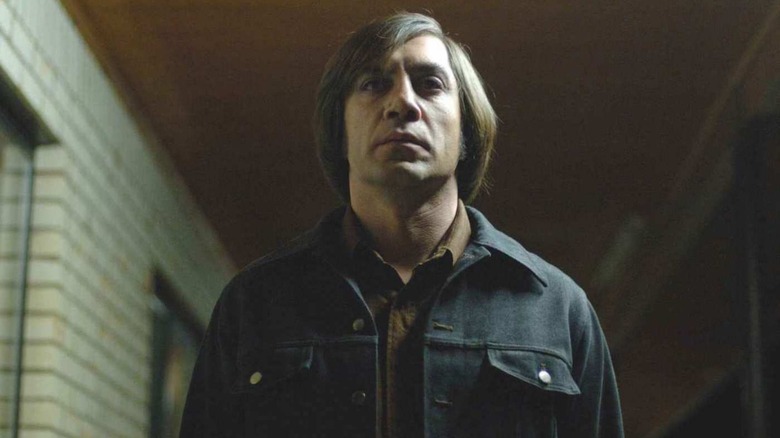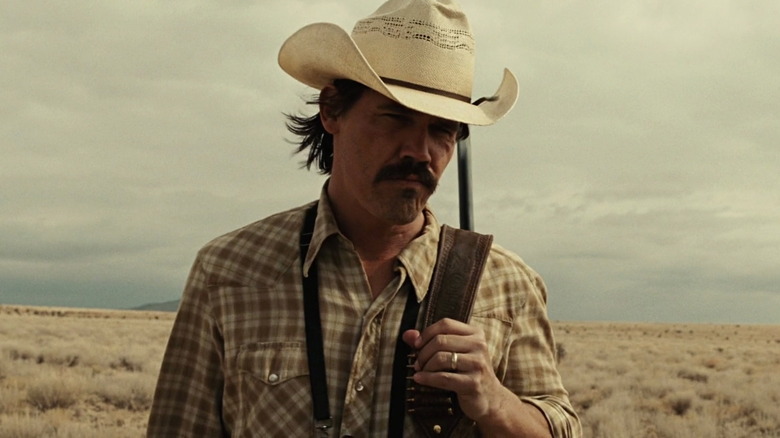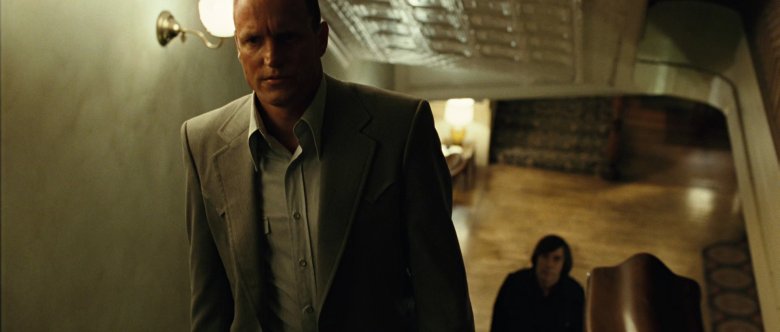10 Years Later, The Ending Of 'No Country For Old Men' Is More Powerful Than Ever
It has been almost a decade since No Country for Old Men, the seismic film adaptation of Cormac McCarthy's novel, first went into limited release in the United States. Directed by Joel and Ethan Coen, the winner of the Best Picture Oscar for 2007 is simultaneously steeped in genre tropes and highly unconventional. I still remember hearing the lady in front of me at the local indie theater jeer "That's it? Boo!" as the closing credits rolled.
In a way, the film's plot acts as a Trojan Horse, lowering the viewer's defenses against all things arthouse with an exciting genre premise. A Vietnam vet hunting in the desert comes across the site of a drug deal gone bad. Absconding with a satchel full of drug money, he finds himself on the run from an eccentric hitman who uses an air-powered captive bolt gun to dispatch roadside Good Samaritans and other unwitting marks like human cattle.
If that is all there was to the film, however, we might not still be talking about it ten years later. What gives No Country for Old Men such resonance is what happens when the belly of its Trojan-Horse plot springs open. Then the film reveals itself to be a haunting, literate rumination on mortality, something richer and far more meaningful than the simple chase thriller you thought you were watching. (If you have somehow managed to not see this movie, spoilers do lie ahead.)
Three Perspectives
Like L.A. Confidential — another great literary adaption I wrote about recently — No Country for Old Man centers mainly around three perspectives. Llewelyn Moss, played by Josh Brolin, functions as the film's morally grey everyman. He is the one who makes off with that satchel full of drug money, only to find himself struggling for survival in the face of overwhelming odds. Pit bulls are biting at his heels, men with submachine guns have checked into the motel room right next door to his, and an assassin who may be the personification of Death itself feels bound by his own murderous principles to do him in, regardless of whether or not he returns the money.
To his credit, Moss is resourceful, and for a while, he manages to skate by, if not entirely validate his wife's assertion that "he can take all comers." It seems almost plausible — and necessary, given the conventions of cinema — that he will get out of this situation alive. Unfortunately for him, the strangely coiffed hitman, Anton Chigurh (Javier Bardem, in an Oscar-winning performance), truly is on his trail. Once you accept that Chigurh embodies the Grim Reaper, certain things in the film start to take on added meaning. The way he creeps into the frame, dogging the steps of the cocksure Carson Wells, played by Woody Harrelson. The way he only seems to be thwarted only by chance, whether it be a chance car accident or the chance result of a coin toss.
No Country for Old Men has been called a neo-western, and though he comes riding in late after his initial voiceover, the film does contain something of a cowboy, albeit an aging one, marooned in the modern world among senseless evil. Numerous close-ups allow us to the luxuriate in the craggy facial features of Tommy Lee Jones, whose character, Sheriff Ed Tom Bell, provides the film's third major perspective.
In the same way that Cormac McCarthy's austerity had a sobering effect on the Coen Brothers, tempering their occasional overindulgence in quirkiness with some heft, the Coen Brothers' less-is-more approach to the source material may have actually improved on McCarthy's novel, tightening up the dialogue, removing inessential plot elements like the young female hitchhiker, and just generally making the story leaner, meaner, and more effective. The only thing that might have suffered a bit in the transition from page to screen is Bell's role, which is perhaps too greatly reduced at the beginning, so that the laconic lawman's importance does not become clear till the end.
Gone are large swaths of Bell's italicized thoughts, which prefaced each chapter in the book with what literary critic Harold Bloom called "apocalyptic moral judgments." With the way the film subverts audience expectations in its final act, this clearly left some moviegoers (like the woman sitting in front of me at the theater) perplexed as to why the film shifts perspective from Moss to Bell and ends the way it does. To address that, we need to talk about the film's ending.
Bell's Two Dreams
The monologue that closes out No Country for Old Men — especially its last line — could lend itself to a bleak interpretation. If that last line is the key to the movie's meaning, then it certainly would seem to espouse a pessimistic viewpoint. Sitting at the breakfast table with his wife, the now-retired sheriff recounts two dreams he had the night before. These two dreams, the first of which he dismisses quickly, are essentially a riff on an old quote, one that is often attributed to Benjamin Franklin, but actually dates back further:
"Tis impossible to be sure of any thing but Death and Taxes."
Death and taxes. Mortality and money. That is what it all boils down to. The funny thing is, Bell cannot remember the Taxes dream well. All he seems to recall is that it was about him receiving some money from his father and then losing it. Here "taxes" is taken to be representative of the idea that you have to pay to live, like the filling station proprietor betting his life against a coin flip. Each decision a person makes becomes a small wager of his or her own continued existence against the future. Even when we don't realize it, we're making the bet. "You've been putting it up your whole life," Chirgurh says. In a later paragraph in the book, he also adds, "And then one day there's an accounting."
Where Llewelyn Moss erred was in thinking he could get out ahead of that. But of course, nothing in life is free. "The house always wins." And so Death finally catches up with Llewelyn Moss, calling him to account unceremoniously, off-screen. You think he's the central protagonist, just like the human ego positions everyone to be the hero in his or her own mind. But in the end, he dies, each of us passes, and the story goes on. Fear the Reaper ...
The Reaper will catch up with Ed Tom Bell, too, but Bell is fully cognizant of that. It is the question of what lies beyond Death (if anything) that leaves him pondering his two dreams. His forgetfulness, the inconsequentiality with which he regards the first dream, effectively dispels the certainty of Taxes, leaving Death as the only certainty, it would seem.
But is that all there is, or is there a light in the darkness, something more beyond? Conveyed in simple, yet powerful imagery, Bell's second dream hints at this notion, as he relates how he saw himself and his father as riders in the snow at night, with his father riding on ahead of him to light the dark.
In interviews, Tommy Lee Jones often comes across as terse and unyielding, a man who does not suffer fools gladly. Speaking to Uncut in 2008, however, he did offer one interesting takeaway for Bell's closing monologue:
The last speech is a contemplation of hope, a dream about however dark and cold the world might be, however long the ride through it might be. That at the end you know that you will go to your father's house and it will be warm, or to a fire that your father has carried and built for you. The last sentence of the movie is, "And then I woke up." It's a contemplation of the idea of hope. Is it an illusion? Is it just a dream? And if it is, is the dream real?
In The Road, Cormac McCarthy's Pulitzer-Prize-winning follow-up to No Country for Old Men, the novelist would return to this idea, invoking similar imagery with dialogue between a father and son about "carrying the fire." Director John Hillcoat adapted that post-apocalyptic book into a film and while he mostly succeeded, the final result wound up lacking grandeur, feeling in some ways like it was just an unusually high-brow episode of The Walking Dead. At its essence, however, The Road is more picaresque, less plot-driven than No Country for Old Men, and in that respect, it could never hope to be as good of an all-around film, perhaps.
Fortunately, we had the Coen brothers, two of our greatest living filmmakers, to adapt one of our greatest living novelists, into one of the greatest American films of the 21st century thus far. As the tenth anniversary of its Hollywood premiere approaches, No Country for Old Men lives on as the consummation of a perfect marriage between film and literature.
Are you carrying the fire?


